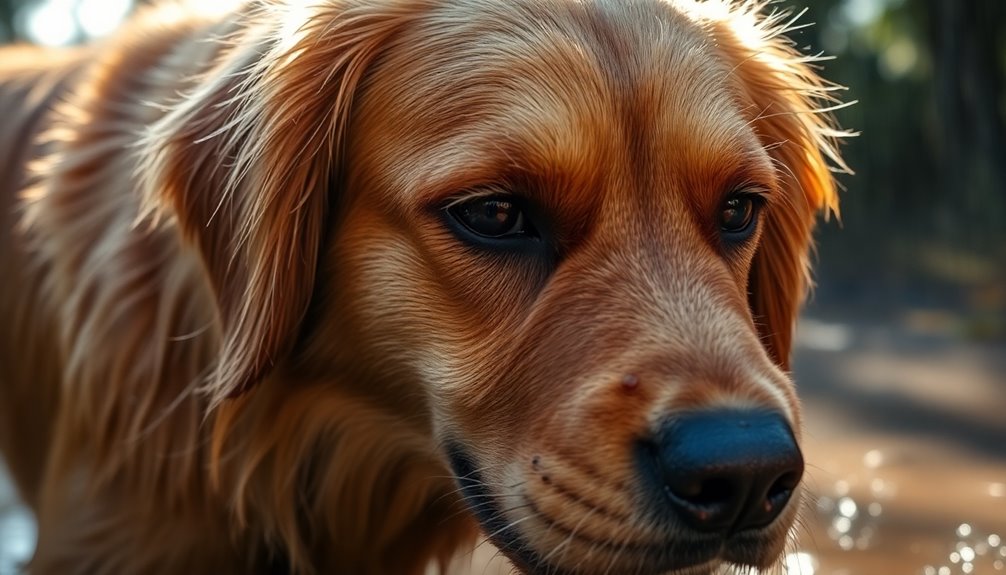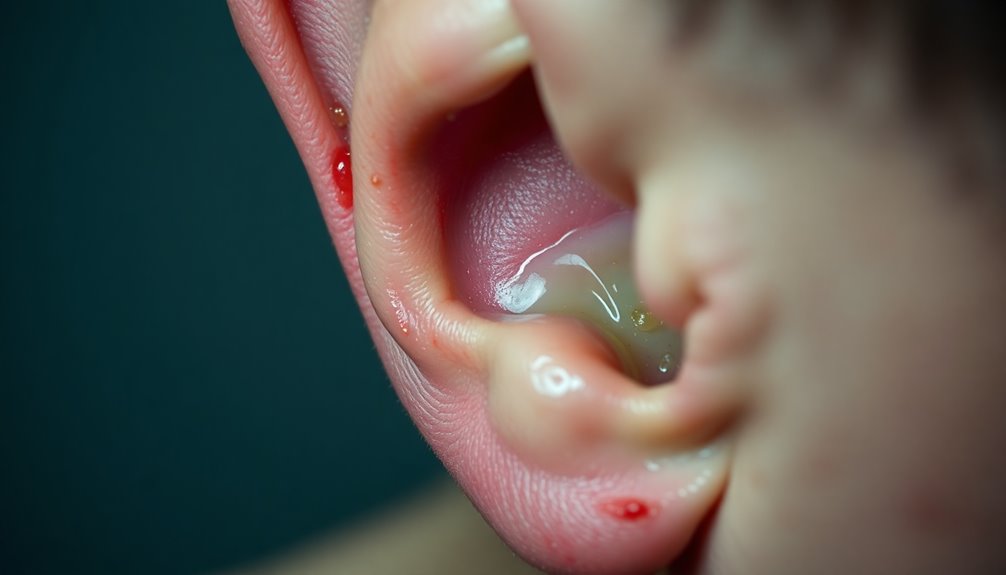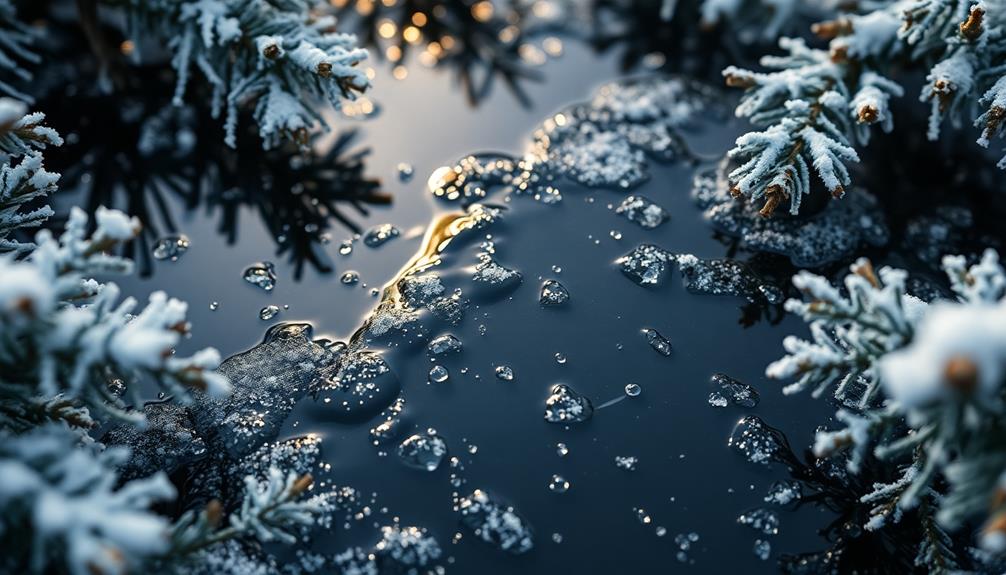Wet dog smell hits you with a unique mix of sour and earthy notes, often resembling almond, fruit, and even hints of mushrooms. This scent comes from a cocktail of yeast and bacteria that thrive on your dog's skin, which releases volatile compounds when their fur gets wet. You might notice it more after rain or swimming, especially in humid conditions where moisture amplifies the odor. While some find it nostalgic and comforting, others see it as unpleasant. If you're curious about tips to manage this smell or its deeper implications, there's much more to explore.
Key Takeaways
- Wet dog smell is a unique blend of almond, fruit, honey, and mushroom notes, with sulfur undertones from microbial waste breakdown.
- The scent intensifies when dogs are wet due to yeast and bacteria on their skin releasing volatile organic compounds (VOCs).
- Humidity exacerbates the odor, causing it to linger and become stronger, especially after rain or swimming.
- Dogs with oily skin or moisture-retaining wrinkles typically emit a more potent wet dog odor.
- Cultural perceptions of wet dog smell vary; some find it nostalgic and comforting, while others may find it unpleasant.
Introduction
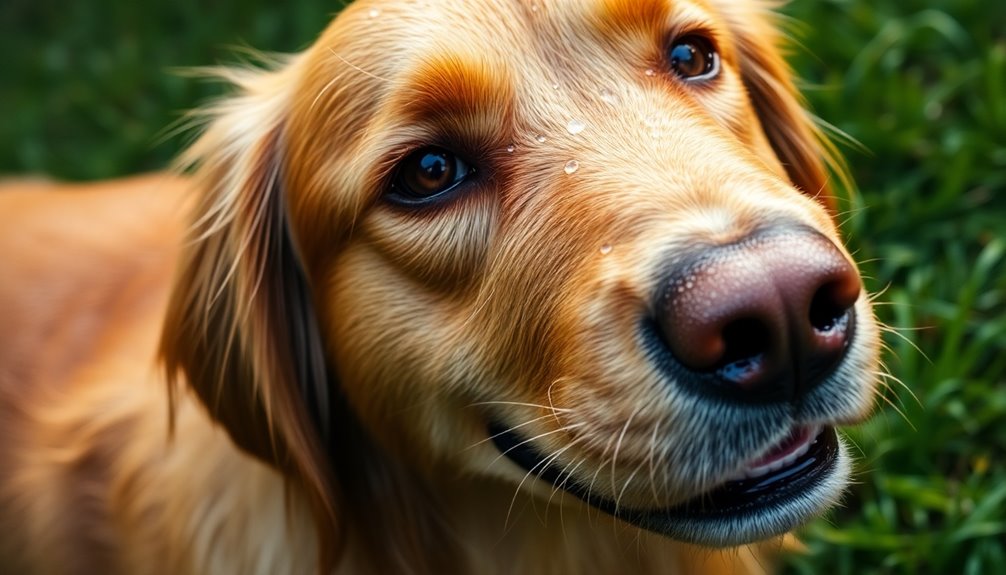
Experiencing the distinctive scent of a wet dog can be both amusing and puzzling. You might wonder why your furry friend emits such a unique aroma when they get soaked. The wet dog smell primarily arises from the presence of yeast and bacteria living on your dog's skin. When their fur gets wet, these microorganisms release volatile organic compounds (VOCs) that create that unmistakable scent.
Humidity plays a significant role in intensifying this odor. In moist environments, the growth of odor-causing bacteria and yeasts is accelerated, leading to a stronger smell. On average, a dog's skin can host up to 16,500 bacteria per square centimeter, contributing to the pungency of the wet dog smell.
Factors like your dog's breed, grooming habits, and exposure to water can also affect the character and strength of this aroma. While some breeds might have a milder scent, others can produce a more pronounced odor when wet. Understanding these elements helps you appreciate the science behind the smell, making it less of a mystery and more of an entertaining quirk of dog ownership.
Description of the Smell
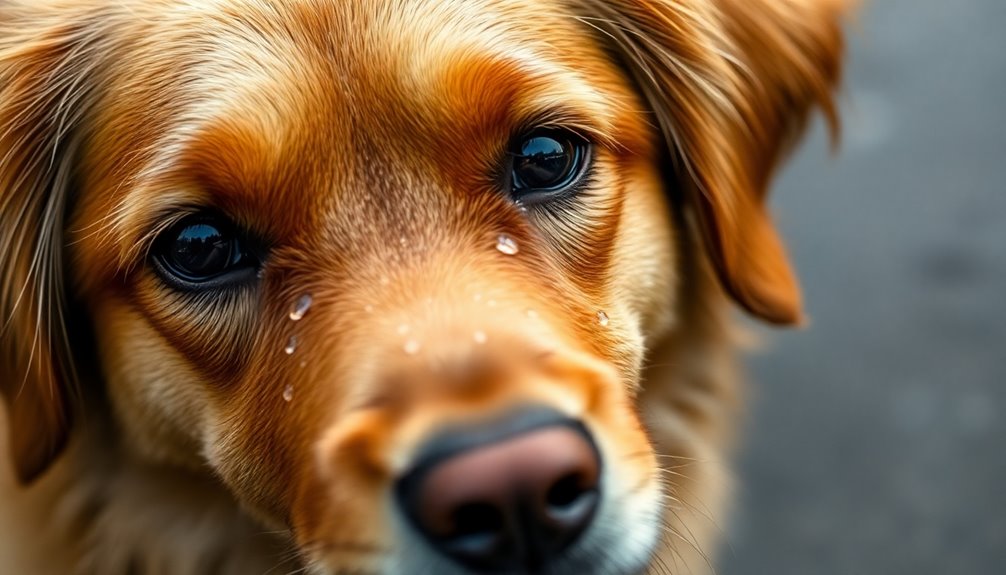
The wet dog smell is a unique blend of aromas that can be both familiar and jarring. When you catch a whiff, you might notice an odd mix of scents that includes notes of almond, fruit, honey, and even mushroom. This peculiar smell often has a hint of sulfur, setting it apart from other odors you encounter.
As dogs get wet, moisture activates the microbial life on their skin, releasing volatile organic compounds (VOCs) that contribute to this distinctive scent. The intensity of the smell can really ramp up in humid conditions; moist air holds more odor molecules, creating what some might call a "stink cloud."
You might find that the wet dog smell is particularly strong when your furry friend has just come in from the rain or a swim. That's because the water dissolves the waste from the bacteria and yeasts living on their fur, making the scent more pronounced than when they're dry. All in all, it's a smell that's unmistakable and can evoke a range of reactions, from nostalgia to a wrinkled nose.
Source and Composition
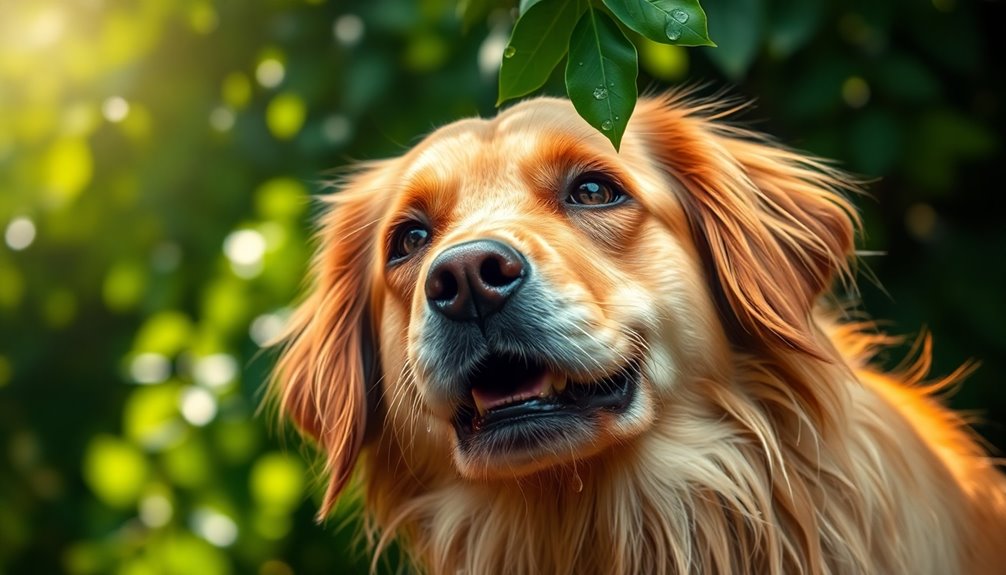
Wet dog smell stems from a complex interplay of bacteria and yeasts residing on your dog's skin. When your dog gets wet, these microorganisms release volatile organic compounds (VOCs) that contribute to that distinctive aroma. The chemistry behind this scent includes notes of almond, fruit, honey, and even mushroom, with sulfur undertones arising from microbial waste breakdown.
Your dog's skin can host up to 16,500 bacteria per square centimeter, and when water activates these germs, it amplifies the odor. As water evaporates from your dog's fur, it carries these odor molecules into the air, creating a notable "stink cloud" around them. This is why the smell is especially potent after a bath or a swim.
The specific composition of dog smells can differ based on several factors, including your dog's diet, breed, and any skin folds that may retain moisture and odor. So, the next time your dog shakes off after getting wet, remember that their unique scent is a result of the fascinating interactions happening on their skin.
Typical Scenarios or Environments
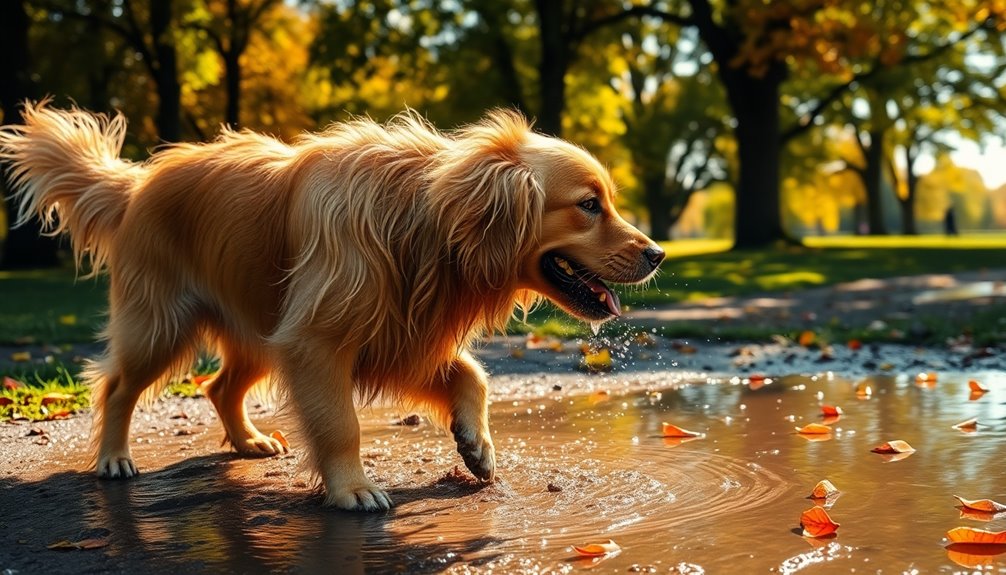
When dogs come in from the rain or finish a swim, they often shake off, releasing a noticeable wet dog smell into the air. This scent is especially pronounced in humid environments, where moist air retains odor molecules, amplifying that unmistakable aroma. You might notice it more if your dog's just been frolicking in puddles or has a tendency to roll in mud—those moments create a "stink cloud" around them.
Certain breeds, like Basset Hounds or Chinese Shar-Pei, are particularly prone to emitting stronger odors due to their oily skin or moisture-retaining wrinkles. You'll find that their collars and harnesses often capture this scent, making it linger even after they've dried off.
Once your dog enters your vehicle or home, the wet dog smell can settle into upholstery and soft furnishings, hanging around long after the dog is dry. If it's humid outside, expect that scent to be even more intense as the air traps the odor. These typical scenarios highlight just how quickly your dog can turn a fresh space into a smelly one!
Emotional or Cultural Associations
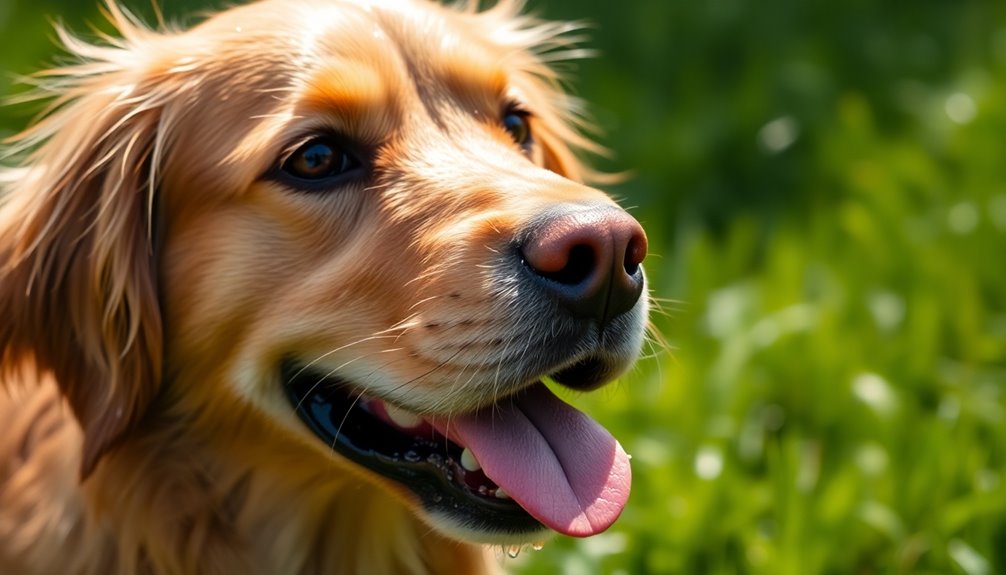
Experiencing the distinct scent of a wet dog can trigger a range of emotions and cultural perceptions. For many dog owners, that wet dog smell stirs up feelings of nostalgia, reminding you of joyful moments spent outdoors with your furry friend. While some may find the odor unpleasant, it often transforms into a comforting reminder of pet companionship over time.
Cultural attitudes toward pet odors vary widely; in some cultures, the natural scent of animals symbolizes love and affection, while in others, it's viewed as undesirable. This disparity highlights how your connection with dogs can influence your perception of their smell. As societal trends shift towards valuing pet companionship, more people embrace the complexities of animal care, including accepting the wet dog smell as part of the experience.
Ultimately, your emotional reaction to that distinct scent may depend on your memories and experiences with your pet. What might initially seem like a strong odor can evolve into a familiar and warm presence, further solidifying the bond you share with your canine companion.
Health or Safety Considerations
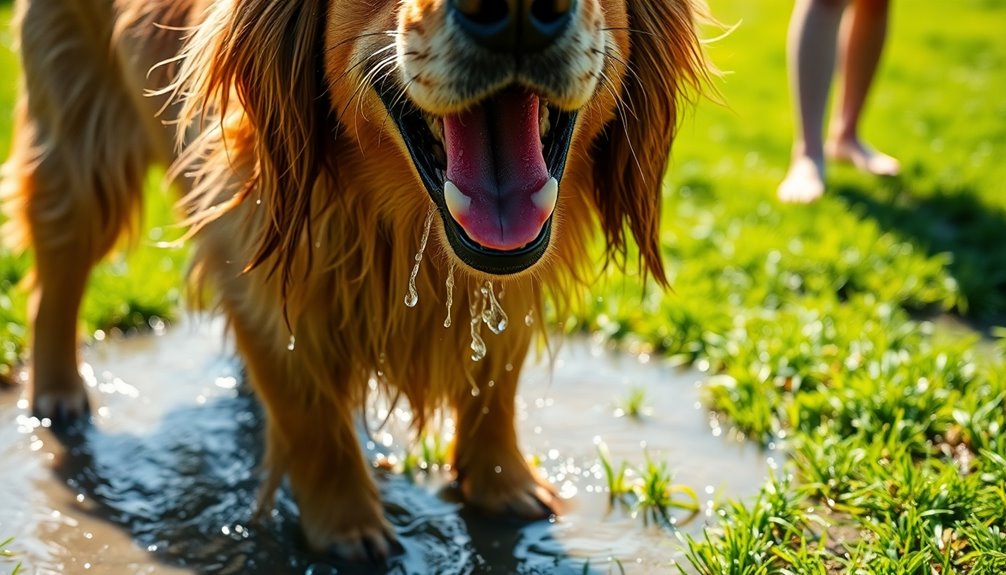
Recognizing the distinct wet dog smell can be crucial for your pet's health. This odor might indicate underlying issues, such as yeast or bacterial infections, especially if it's persistent. Certain breeds, particularly those with skin folds or oily skin, are more prone to these odors. That's why you should regularly clean your dogs to prevent health complications.
Maintaining proper hygiene through routine grooming and bathing helps manage odors while promoting skin health. After washing your dog, make sure to dry them thoroughly; excessive moisture can lead to skin irritations or infections. Remember, harnesses often retain smells, so it's essential to wash them alongside your pet to keep any lingering odors at bay.
Regular veterinary check-ups are vital too. They can help monitor and address any odor-related health concerns before they escalate into more serious issues. By being proactive and attentive to your dog's hygiene and health, you'll not only keep those unpleasant smells away but also ensure a happier, healthier life for your furry friend.
Final Thoughts
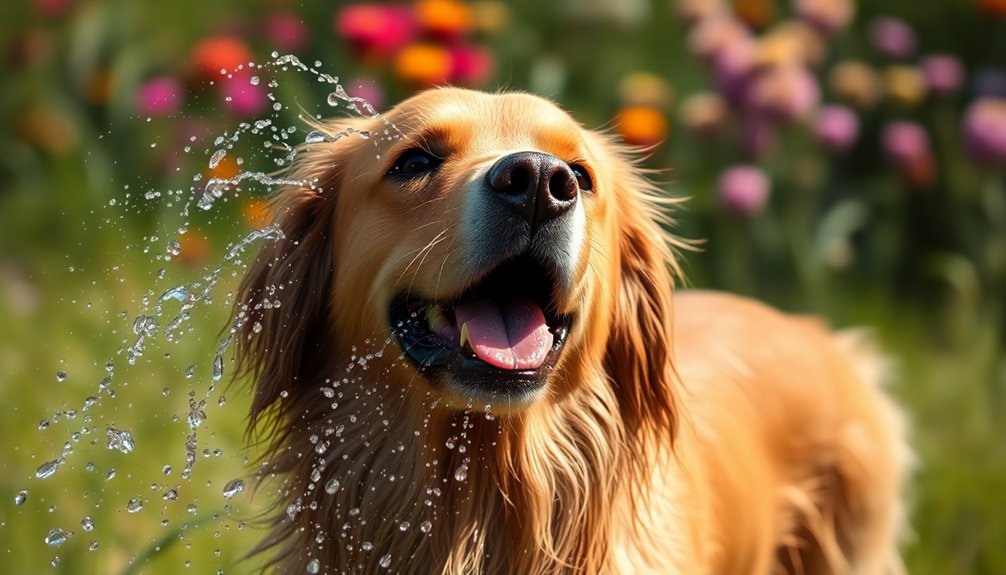
Understanding the wet dog smell can help you take better care of your furry friend. This unique scent arises from bacteria and yeasts on your dog's skin, producing volatile organic compounds that intensify when they're wet. To keep the odor at bay, it's essential to regularly groom and bathe your dog. After bath time or a rainy day romp, make sure you dry your dog thoroughly. Using a heavy-duty dog towel can help absorb moisture and prevent that lingering smell from developing.
Keep in mind that certain breeds, especially those with skin folds, may require extra attention. Moisture can get trapped in their unique skin characteristics, leading to a stronger scent. You should also consider washing your dog's other belongings, like bedding and toys, as they can harbor odors as well.
Frequently Asked Questions
How Do You Describe Wet Dog Smell?
When you encounter the smell of a wet dog, you notice a unique blend of odors. It's a mix that can remind you of damp earth and a hint of mustiness, often with fruity or almond-like notes. You might catch a whiff of something akin to mushrooms or even a faint sulfur scent. This complex aroma often lingers, especially in humid conditions, creating an unmistakable "stink cloud" around your furry friend.
What Else Can Smell Like a Wet Dog?
You might notice that damp towels or old clothes can give off a musty smell, similar to wet dog. If you've got humid conditions, mildew or mold can also produce that distinct odor. Even old carpets can trap moisture and develop an unpleasant scent. Interestingly, some cats, like Maine Coons, can smell wet when they're damp. Certain cheeses, especially Limburger, might surprise you with a wet dog-like aroma too!
What Causes Wet Dog Smell in Humans?
Wet dog smell in humans often comes from exposure to damp environments or certain fabrics that trap moisture and bacteria. When you sweat or get wet, bacteria on your skin can break down sweat and produce odor. If you've been around wet dogs or in humid places, that smell can stick to you. It's all about how moisture activates those microorganisms, leading to that unmistakable, lingering scent you might notice on yourself.
How Would You Describe the Smell of a Dog?
When you encounter the smell of a dog, you might notice it's earthy and musky, often carrying a hint of warmth. It can remind you of damp soil or a cozy, worn blanket. Depending on the dog's activities and grooming, this scent can vary. If they've been outside, you might catch traces of grass or even a whiff of something like wet fur, which adds a unique charm to their overall aroma.
